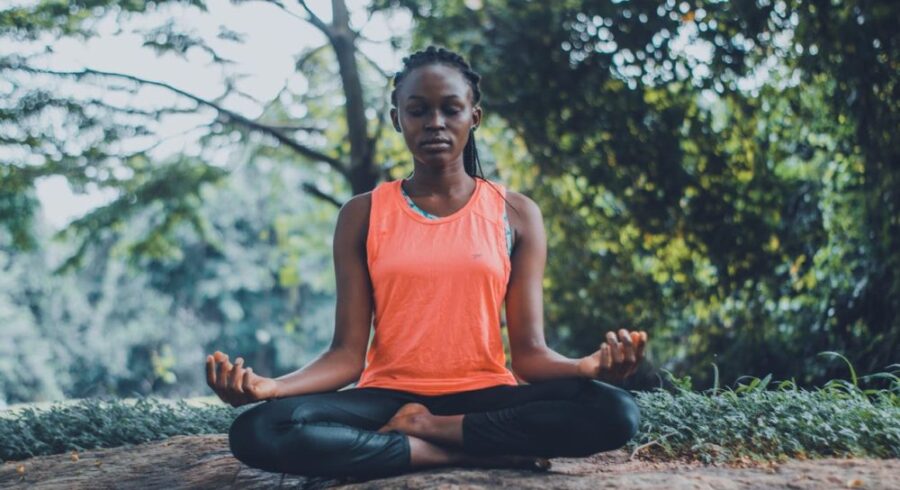
Many people like to meditate because it makes them feel better and lighter, yet not everyone knows meditation’s effects on the brain.
Unfortunately, some people believe that meditation is just a couple of breathing exercises that you can do for a couple of minutes and then move on with your life. This misconception makes it harder to convince people to at least try meditation and see its effects for themselves.
What Is Meditation?

Meditation sums up a bunch of techniques that help relax the mood and increase focus. It’s like hitting the pause button on your brain. Different cultures and religions have been using meditation as part of their rituals for thousands of years. Almost all religions use some type of meditation in their religious practices.
Types Of Meditation
There are many types of meditation that serve different purposes, including:
Mindfulness Meditation
This type features paying attention to each thought as it occurs so you can analyze it and take notes of it. It allows you to be fully present in the moment and highly aware of your thoughts. It can be practiced alone because it’s extremely easy and barely needs a guide.
Spiritual Meditation
This is the type that most religions use, as it’s supposed to help the meditator find a deeper understanding of God, and eventually connect with a higher power. It’s perfect for people who are seeking spiritual growth.
Focused Meditation
As the name states, focused meditation is all about having something to focus on. Instead of not focusing on anything like you do with classic meditation, you focus on a certain object and stay in the present.
Movement Meditation
Often people confuse this type of meditation with Yoga. However, the two are very different from each other. As we know, classic meditation is often practiced while sitting in a comfortable position. This type, however, can be practiced while being physically active. Its main goal is to energize the body and make a deeper connection between your body and the present.
Mantra Meditation
This type of meditation is often used in religious teachings and it’s practiced by repeating a certain sound. The sound can be anything from a word to a phrase. This type of meditation aims to reach deep levels of awareness and clear the mind.
There are other meditation types out there that are worth a try, such as transcendental meditation, progressive relaxation, loving-kindness meditation, and much more. You can read more detailed information on the different types of meditation here.
Meditation’s Effects On The Brain
According to Charles Tebbetts in his book on self-hypnosis, meditation offers complete relaxation and freedom from stress, hence renewed energy, decreased anxiety, and improved physical and psychological health.
I personally believe that practicing meditation is like hitting the reset button. It gives you a chance to stop, analyze, and free your mind. We have all wished at some point in our lives for our brains to just stop working for a second, to take a break. Well, with meditation, that wish easily comes true.
Meditation can also help us get a great sense of well-being as it can reduce mental stress and improve our focus abilities.
Not only that, but meditation can also have physical effects on the brain. Apparently, our brain starts to deteriorate as we age but with the help of meditation, it can maintain its health. Additionally, meditation can thicken the prefrontal cortex. That’s the part of our brain in charge of decision-making and impulse inhibition. We all want that part of our brain to be strong and healthy at all times, don’t we?
As we all know, our brain naturally releases a bunch of brain chemicals that play a big role in keeping hormonal balance. Meditation can affect the level of the produced neurotransmitters in the brain. It can also increase Serotonin, decrease Cortisol, boost levels of DHEA, increase Endorphins, and boost Melatonin.
Meditation has also been proved to help with anxiety, addiction, suicidal thought, depression, and many other mental issues.
The fact that all of this can be achieved after a couple of meditation sessions is mind-blowing. It’s a wonder that some people mock those who meditate when we should all be practicing meditation daily.
How To Meditate
Now that you know the positive effects of meditation on the brain, it’s time to take some action and start meditating.
Although some people choose to dedicate a space in their home for meditation, you can actually meditate anywhere you want as long as it’s calm and quiet. I personally like to meditate on my bed before going to sleep but to each their own.
It’s better to follow a tutorial when you first start to meditate as it’s something new and you might not know what you are doing. This is my go-to meditation tutorial that’s short and easy to follow.
Doing Research On Meditation
What I like about the time we live in is that everything is within reach. You can learn new things easily with a click of a button as long as you have a stable internet connection. You can also read a book on meditation that will answer any question you might have.
Worry not, I have already done the hard work and brought you this short recommendation list of books that are perfect for meditation beginners.
- How to Meditate: A Practical Guide to Making Friends with Your Mind by Pema Chödrön
- Meditation for Beginners by Jack Kornfield
- 8 Minute Meditation Expanded: Quiet Your Mind. Change Your Life by Victor Davich
- Practical Meditation for Beginners: 10 Days to a Happier, Calmer You by Benjamin W. Decker
Now that you know everything there is to know about meditation, including its effects on the brain, it’s time you join fellow meditators and get some calm and inner peace.
